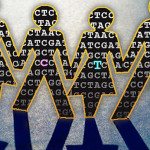
One of the biggest challenges of drug discovery is to determine which targets, when perturbed, will have an acceptable efficacy-safety therapeutic window in patients. In fact, the success rate at choosing the right target and developing a safe and effective drug is quite low: less than 10% of drugs that enter Phase I are approved by regulatory authorities (see recent Nature Reviews Drug Discovery article here, Derek Lowe blog here). Most of the failures in Phase II and III are due to lack of efficacy or unexpected toxicity.
Human genetics offers one potential solution to identify new drug targets with an acceptable therapeutic window. A study published this week in Science Translational Medicine (STM) provides genetics support for an established therapeutic target in type 2 diabetes (T2D), glucagon-like peptide-1 receptor, GLP1R (link to STM article here). What is surprising, however, is that human genetics suggests that GLP1R agonists may also protect from coronary heart disease (CHD).
[Disclaimer: I am a Merck/MSD employee. The opinions I am expressing are my own and do not necessarily represent the position of my employer.]
There are three points that I want to make in this blog. First, the STM study provides general support for the model that human genetics is useful to predict efficacy & safety in drug discovery.…
Read full article...

At the Harvard-Partners Personalized Medicine Conference last week I participated in a panel discussion on complex traits. When asked about where personalized medicine for complex traits will be in the future, I answered that I envision two major categories for personalized therapies.
(1)Development of drugs based on genetic targets will lead to personalized medicine; and
(2)Large effect size variants will be detected in clinical trials or in post-approval studies and will lead to personalized medicine.
This answer, I said, was based in part on current categories of FDA pharmacogenetic labels and in part on how I see new drug discovery occurring in the future. But did the current FDA labels really support this view?
The answer is “yes”. In reviewing the 158 FDA labels (Excel spreadsheet here), my crude analysis found that 31% of labels fall into the “genetic target” category (most from oncology – 26% of total) and 65% fall into the “large effect” category (most from drug metabolism [42% of total], HLA or G6PD [15% of total]).
A subtle but important point is that I predict that category #2 (PGx markers for non-oncology “genetic targets”) will grow in the future. In other words, development of non-oncology drugs will riff-off the success of drugs developed based on somatic cell genetics in oncology. …
Read full article...



